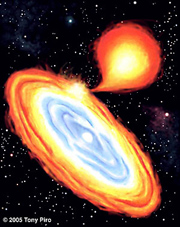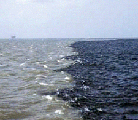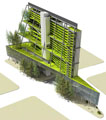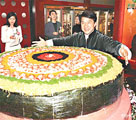


An unusual supernova rediscovered in seven-year-old data may be the first example of a new type of exploding star, possibly from a binary star system where helium flows from one white dwarf onto another and detonates in a thermonuclear explosion. In a paper first published online Nov. 5 in the journal Science Express, UC Berkeley and Berkeley Lab astronomer Dovi Poznanski and his colleagues describe the outburst, dubbed SN 2002bj, and why they believe it is a new type of explosion. More>
 Among the many changes in the ocean is the expansion of oxygen-deficient or oxygen minimum zones (OMZs), also known as dead zones, which affect the processes by which carbon is captured and sequestered on the seafloor and alter the microbial activities that impact the rate and magnitude of ocean carbon sequestration. Despite the importance of these effects, very little is known about the metabolism of OMZ microbes and how they respond to environmental changes. In the Oct. 23 issue of the journal Science, researchers from the University of British Columbia and the Joint Genome Institute describe the metagenome of an abundant but uncultivated microbe, known as SUP05, that is silently helping to shape the ecology of OMZs worldwide. More>
Among the many changes in the ocean is the expansion of oxygen-deficient or oxygen minimum zones (OMZs), also known as dead zones, which affect the processes by which carbon is captured and sequestered on the seafloor and alter the microbial activities that impact the rate and magnitude of ocean carbon sequestration. Despite the importance of these effects, very little is known about the metabolism of OMZ microbes and how they respond to environmental changes. In the Oct. 23 issue of the journal Science, researchers from the University of British Columbia and the Joint Genome Institute describe the metagenome of an abundant but uncultivated microbe, known as SUP05, that is silently helping to shape the ecology of OMZs worldwide. More>
 Year of Science: Isotope Geochemistry — Deciphering Earth’s Notebook
Year of Science: Isotope Geochemistry — Deciphering Earth’s Notebook If planet Earth can be characterized as an ongoing experiment for which exceptionally good but cryptographically hidden notes have been kept, then isotope geochemistry can be thought of as the primary tool by which scientists decipher those notes. Through isotope geochemistry, scientists not only learn about the history and origin of the earth, they can also discover the interrelationships that have produced past climate change, explore for new sources of geothermal energy, and more>
 Special Event: Gadgil Gives Campus Talk on Berkeley Lab Energy Research
Special Event: Gadgil Gives Campus Talk on Berkeley Lab Energy Research Ashok Gadgil, acting director of the Lab’s Environmental Energy Technologies Division, will give a talk on "Research to Improve Energy Efficiency of U.S. Commercial Buildings: The Berkeley Vision" today at noon in 250 Sutardja Dai Hall (campus). His talk will also be webcast (link will be live just before noon). The event is sponsored by CITRIS (Center for Information Technology Research in the Interest of Society).
 Special Event: Symposium on Green Building Features Lab Speakers
Special Event: Symposium on Green Building Features Lab Speakers A symposium on "Green Building, the Economy and Public Policy" will be held Wednesday and Thursday, Dec. 2 and 3, at the Brower Center in Berkeley (2150 Allston Way). Among the featured speakers is Alan Sanstad and Steve Selkowitz, with the Environmental Energy Technologies Division, and Lab veteran Art Rosenfeld. Admission is free for UC Berkeley students and faculty. More>
 Special Event: Campus Students to Construct Giant California Roll
Special Event: Campus Students to Construct Giant California Roll [Hokubei] UC Berkeley students will build a giant California roll on Sunday from noon to 1:30 p.m. on upper Sproul Plaza. The students plan to construct a 330-foot-long roll, starting at the plaza fountain just north of the intersection of Bancroft Way and Telegraph Avenue and going north to Sather Gate. Their goal is to best the current world record of 300 feet set in Maui in 2001. More>
Today at Berkeley Lab is produced by Public Affairs' Communications Group